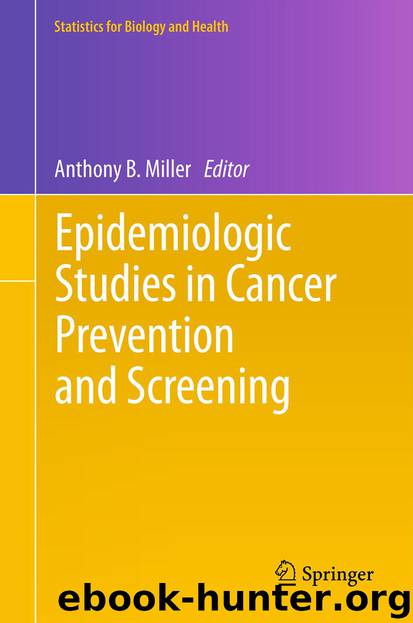Epidemiologic Studies in Cancer Prevention and Screening by Anthony B. Miller

Author:Anthony B. Miller
Language: eng
Format: epub
Publisher: Springer New York, New York, NY
13.3.2 The Problem of Overdiagnosis
If a randomized screening trial is performed with the immediate objective of determining the relative sensitivity of the new test compared with the old for progressive disease as just described and the sensitivity of the new test for progressive disease is demonstrated to be superior to the old, is that sufficient to justify substituting the new test for the old in routine screening programs? Unfortunately not, as there is at least one other feature of the test to estimate in order to be able to compare the cost of the management of the abnormalities detected by the two tests and especially the extent the new test results in more overdiagnosis than the old, defining overdiagnosis as the detection of disease in an individual that was not destined to progress and cause symptoms in that individual’s lifetime. Although it may be possible to use some indicators of the probability of progression to obtain some indication of the probability of overdiagnosis, such as the Gleason score for prostate cancer, an overdiagnosed case may be histologically and biochemically indistinguishable from a case that is destined to progress, because of the effect of competing causes of mortality.
Overdiagnosis is probably universal for all cancer screening, even when there may be no efficacy demonstrable for the screening. If, in a randomized trial performed to assess the sensitivity for progressive disease, the cancer detection rate from screening is significantly greater for the new test than the old, the increase in detection could be due to greater lead time from the new test or increased overdiagnosis or both. If screening stops in both arms, further follow-up without screening which exceeds the lead time gained by the two tests will indicate whether all the increase is due to lead time, when the cumulative incidence becomes equal. But if the cumulative incidence in the two arms never equalize, the difference between the two cumulative incidence rates will indicate the contribution of additional overdiagnosis from the new test.
Determining the extent or even the presence of overdiagnosis of cancer when the screening test detects a presumed precursor of the cancer as well as any cancers present is very difficult. For example, incidence is reduced following screening for colorectal cancer because some of the adenomas are destined to progress to invasive cancer, and their detection and removal prevents this. The incidence gap between screened and control groups will continue to widen until the effect of such removal is spent. In this instance because of the effect of the removal of precursors, incidence of invasive cancers will be less in the screened group than the control. Nevertheless, it is still likely that some overdiagnosis of cancer is occurring; it is being masked by the removal of precursor lesions. It is also likely, by analogy with other sites, that the greater the sensitivity of the test the greater the extent of overdiagnosis. So it is likely that overdiagnosis will be greater with new tests than with the old.
Download
This site does not store any files on its server. We only index and link to content provided by other sites. Please contact the content providers to delete copyright contents if any and email us, we'll remove relevant links or contents immediately.
| Administration & Medicine Economics | Allied Health Professions |
| Basic Sciences | Dentistry |
| History | Medical Informatics |
| Medicine | Nursing |
| Pharmacology | Psychology |
| Research | Veterinary Medicine |
Tuesdays with Morrie by Mitch Albom(4767)
Yoga Anatomy by Kaminoff Leslie(4355)
Science and Development of Muscle Hypertrophy by Brad Schoenfeld(4122)
Bodyweight Strength Training: 12 Weeks to Build Muscle and Burn Fat by Jay Cardiello(3956)
Introduction to Kinesiology by Shirl J. Hoffman(3765)
How Music Works by David Byrne(3257)
Sapiens and Homo Deus by Yuval Noah Harari(3061)
The Plant Paradox by Dr. Steven R. Gundry M.D(2608)
Churchill by Paul Johnson(2577)
Insomniac City by Bill Hayes(2545)
Coroner's Journal by Louis Cataldie(2474)
The Chimp Paradox by Peters Dr Steve(2373)
Hashimoto's Protocol by Izabella Wentz PharmD(2371)
The Universe Inside You by Brian Clegg(2129)
Don't Look Behind You by Lois Duncan(2122)
The Immune System Recovery Plan by Susan Blum(2056)
Endure by Alex Hutchinson(2019)
The Hot Zone by Richard Preston(2012)
Woman: An Intimate Geography by Natalie Angier(1933)
